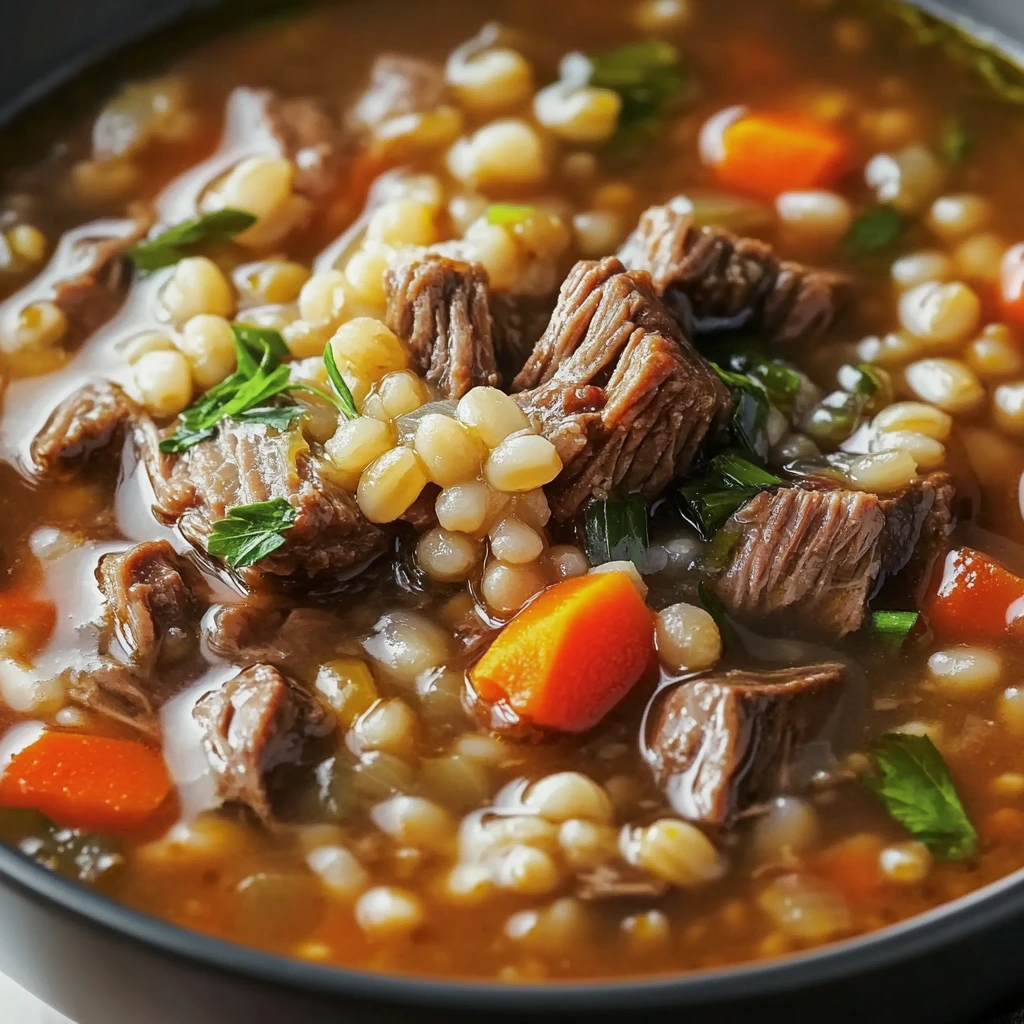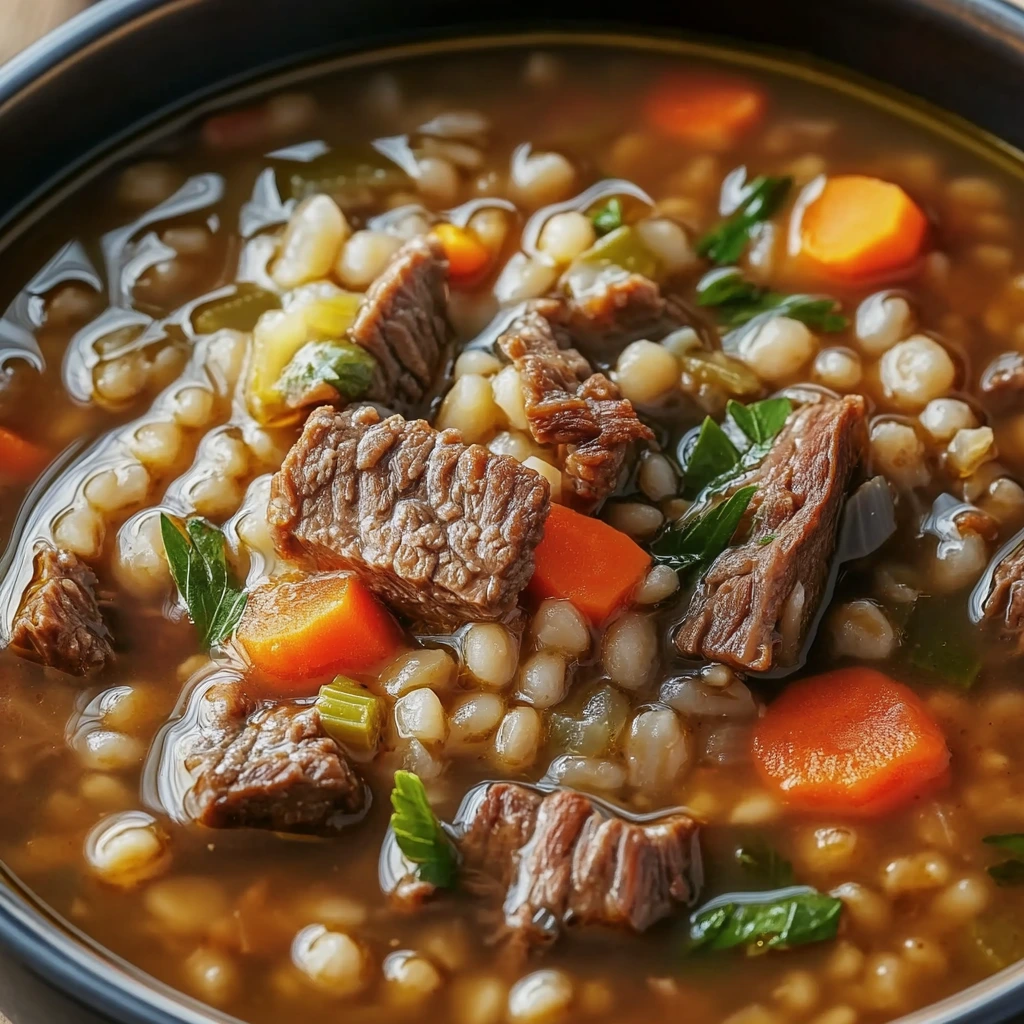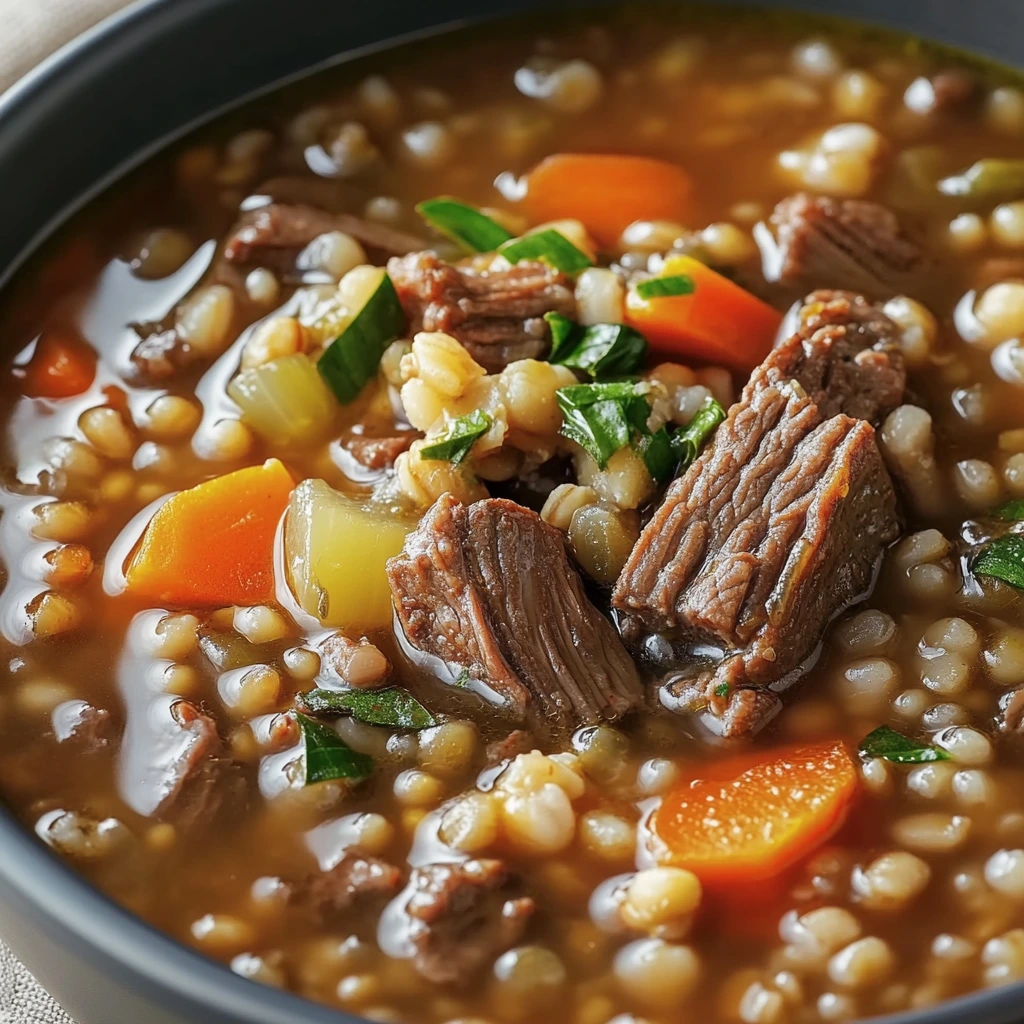 Pin it
Pin it
The moment you taste a spoonful of this Hearty Beef Barley Soup, you'll understand why it deserves a permanent spot in your winter recipe collection. This soul-warming dish transforms simple ingredients into a rich, satisfying meal that tastes like it simmered all day in a restaurant kitchen. The tender chunks of beef, perfectly cooked barley, and sweet carrots create a harmony of flavors and textures that will have everyone reaching for seconds.
Last winter, I made this soup for a neighborhood potluck, and three families requested the recipe before the night was over. My secret? Taking the time to properly brown the beef creates those beautiful, flavorful bits at the bottom of the pot that transform the broth into something extraordinary.
Essential Ingredients and Selection Tips
- Boneless Chuck Roast: Look for pieces with good marbling throughout, as this fat will melt during cooking to create incredible flavor and tenderness. I've found that cutting it into 3/4-inch cubes provides the perfect bite-size pieces after cooking
- Pearl Barley: This variety is more readily available and cooks to a lovely tender texture. I've noticed the best quality barley has a slight sheen and uniform color. Store it in an airtight container to maintain freshness
- Carrots: Choose firm, bright orange carrots with their tops removed. The sweetness they develop during slow cooking balances the savory elements of the soup. I prefer cutting them into hearty chunks rather than thin slices for better texture
- Beef Broth: Homemade is undoubtedly best, but a good-quality store-bought variety works well too. Look for low-sodium options to better control the saltiness of your final soup
The marriage of these simple ingredients creates something far greater than the sum of its parts. I've found that the long cooking process allows the barley to release its starch, naturally thickening the soup while the beef becomes fork-tender.
 Pin it
Pin it
Detailed Cooking Instructions
- Prepare The Beef
- Begin by cutting your chuck roast into uniform 3/4-inch cubes, trimming excess fat but leaving some for flavor. Pat the meat dry with paper towels – this crucial step ensures proper browning rather than steaming. Heat a large Dutch oven or heavy-bottomed pot over high heat until it's truly hot, then add 2 tablespoons of olive oil and carefully arrange the beef pieces with space between them, working in batches if necessary to avoid overcrowding.
- Master The Browning Process
- Allow the beef to develop a rich brown crust before stirring, which typically takes 3-4 minutes per side. Resist the urge to move the meat too frequently – patience here creates deeper flavor. Continue cooking until all liquid has evaporated and you see the beef developing caramelized edges all around. This step takes about 10 minutes but is worth every second for the depth of flavor it provides.
- Create The Aromatic Base
- Reduce the heat to medium and add your diced onion and chopped carrots to the pot. The vegetables will begin to release moisture, helping to loosen those flavorful browned bits from the bottom. After 3 minutes, add the minced garlic and continue cooking for another 2 minutes until everything begins to soften and the kitchen fills with a mouthwatering aroma.
- Develop The Flavor Foundation
- Add 2 tablespoons of tomato paste and stir constantly for about 1 minute, allowing it to caramelize slightly. This concentrates the flavor and adds richness to the soup. Sprinkle in 1 teaspoon of dried thyme, 1 teaspoon of salt, and 1/2 teaspoon of freshly ground black pepper. Use your spoon to scrape vigorously at the bottom of the pot, incorporating all those browned bits back into the mixture.
- Add Barley And Liquid
- Stir in 1 cup of pearl barley, making sure it's evenly distributed throughout the pot. Pour in 8 cups of beef broth, or more if you prefer a thinner consistency. Bring the mixture to a gentle boil, then reduce the heat to maintain a low, steady simmer. The surface should show gentle movement rather than vigorous bubbling.
- Perfect The Slow Simmer
- Cover the pot with a lid slightly ajar to allow some evaporation, which concentrates the flavors. Maintain a gentle simmer for about 1½ hours, stirring occasionally to prevent sticking. You'll know the soup is ready when the beef easily breaks apart with a fork and the barley has softened but still maintains a pleasant chewiness.
- Final Adjustments
- In the last 15 minutes, taste and adjust seasonings as needed. This is the time to add more salt, pepper, or even a splash of Worcestershire sauce if desired. If the soup has thickened too much for your preference, add additional broth until you reach your desired consistency.
- Rest Before Serving
- Allow the soup to rest off the heat for about 10 minutes before serving. This gives the flavors time to settle and meld together, and brings the temperature to a perfect eating level.
I learned about the importance of proper browning from my grandmother, who would never compromise on this step despite my childhood impatience. Years later, when I began making this soup for my own family, I understood that this attention to detail is what transforms a good soup into an exceptional one.
The Ancient Grain
Barley isn't just delicious – it's one of humanity's oldest cultivated foods, dating back over 10,000 years. This resilient grain has sustained civilizations through harsh winters for millennia, and for good reason. Its exceptional nutritional profile includes impressive amounts of fiber, particularly beta-glucans, which help regulate cholesterol levels and support heart health.
Soup Through The Seasons
While I consider this primarily a winter comfort food, I've adapted it through the seasons by incorporating what's fresh. In spring, I sometimes add fresh peas in the last few minutes of cooking. Summer brings the opportunity to stir in fresh herbs like parsley and chives just before serving. Fall versions often include diced butternut squash added with the carrots.
The Secret To Reheating
Barley continues to absorb liquid even after cooking, so when reheating leftovers, you'll likely need to add additional broth or water. I find that adding 1/4 cup of liquid per cup of leftover soup provides the perfect consistency. Reheat gently on the stovetop rather than using high heat, which can make the beef tough.
Make-Ahead Potential
This soup is perfect for meal prep. I often make a double batch on Sunday afternoons, serving some for dinner and portioning the rest into containers for lunches throughout the week. The flavors only get better with time, making day-three leftovers something to look forward to rather than merely tolerate.
 Pin it
Pin it
I learned these techniques through years of soup-making, including my embarrassing early attempt when I rushed the process and ended up with tough meat and bland broth. Taking my time with each step has made all the difference.
There's something deeply satisfying about serving a pot of this hearty soup on a cold evening. The steam rising from the bowls, the aroma filling the kitchen, and the way conversation naturally slows as everyone savors those first few spoonfuls – these simple moments remind me why certain recipes become treasured family traditions.
What I love most about this soup is its honesty. It doesn't rely on exotic ingredients or complicated techniques – just quality basics transformed through time and attention into something genuinely nourishing. Whether you're cooking for a family dinner or stocking your freezer with wholesome meals, this beef barley soup delivers comfort and satisfaction in every spoonful.
Frequently Asked Questions
- → Can I use a different cut of beef?
- Yes, stew meat or brisket works well if chuck roast isn't available.
- → How do I store leftovers?
- Keep the soup in an airtight container in the fridge for up to 4 days.
- → Can I freeze beef barley soup?
- Absolutely! Freeze in airtight containers for up to 3 months.
- → Should I rinse barley before cooking?
- It's a good idea to rinse pearl barley to remove any dust.
- → Can I add more vegetables?
- Yes! Mushrooms, peas, or celery are great additions.
